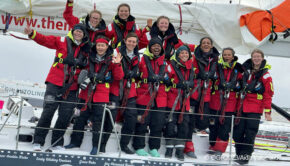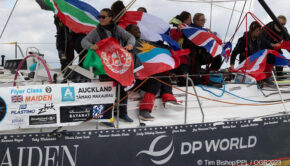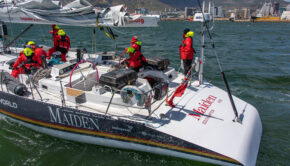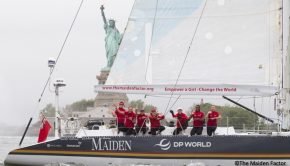From Puzzle to Academy Award nominee
Published on January 3rd, 2020
by Steve Dollar, Los Angeles Times
Mocked as a “tinful of tarts” by a sexist media, the crew of the Maiden made history 30 years ago as the first all-female team to sail a yacht in the Whitbread Round the World Race. The 33,000-mile, nine-month competition was a harsh test even for old salts, let alone a group of young women led by a former deckhand who pursued her dreams out of a troubled English adolescence.
Tracy Edwards, who turned 27 amid the 1989-90 race from Southampton, England, to Uruguay to Australia to Florida and back, is the star of “Maiden,” the Academy Awards-shortlisted documentary that revisits her patriarchy-humbling quest. Several years ago, filmmaker Alex Holmes heard her speak at his daughter’s elementary school.
“I knew right away there was a great film in it,” said the British director, who has toggled between documentary and fiction (“Stop at Nothing: The Lance Armstrong Story,” “House of Saddam”). Edwards, whom critics have likened to a younger Judi Dench, is a charismatic and forthright subject.
But Holmes felt he would have to create a scripted version of her story, until he learned that the Maiden had had S-VHS cameras onboard. “It was music to my ears,” he said.
Yet, that posed one of the greatest challenges to making the film.
“The material was scattered to the four winds,” Holmes said. At each of Maiden’s six stopovers on the race, video footage was handed off to local news organizations who chopped up tape for all kinds of broadcast feeds. “Nobody thought particularly about the historical legacy of all this. It was a jigsaw puzzle going round.”
Over a two-year search, Holmes found footage “in every format imaginable,” including a trove in the attic of Edwards’ mother, who had recorded TV broadcasts about her daughter and the race.
At one point in the film, heavy scan lines dance across Edwards’ face as she’s interviewed, then suddenly vanish as the image leaps in quality. It’s evidence of Holmes splicing together the best of what he had available, and the deft hand of the film’s editor, Katie Bryer.
Those recovered nautical scenes also benefit greatly from the woman who shot them, the film’s secret weapon: Jo Gooding, a childhood friend of Edwards’ who served as Maiden’s cook. “She’s someone who is extremely emotionally intelligent,” said Holmes, who noticed a striking difference when he compared her footage with that from other boats in the race.
“Jo used the camera like she was making a verite documentary. She filmed the crew not just in moments of high drama but in moments of quiet. Her portraiture of the crew really captured the atmosphere of the boat.”
Flashing forward, Holmes began connecting with the crew members some 25 years after the race, sitting the women — as well as competing male sailors and journalists who had dismissed them — for extensive interviews that are excerpted in the film. They all had a surprising amount to say.
“When people haven’t talked about it for awhile, you get a clarity and beyond that an honesty that sometimes you don’t get when people are trying to manage a story, when they’re still in the thick of it,” he said.
The often raw candor and unguarded reflection gives these talking head segments an unusual punch and grit. (Even the men confess to their chauvinism). “They would say, ‘I’m just going to be in the chair for a few minutes because I don’t remember very much,’” Holmes recalled. “Three or four hours later, we’d still be there.”
With all these resources at hand, Holmes had to decide how he wanted to structure the story. As much of the film’s audience may have never been familiar with Edwards and the Maiden’s groundbreaking accomplishment, the narrative could play out in the suspenseful, linear fashion of an underdog sports drama, in which the unlikely heroines triumph over adversity to win against all odds.
The crew was headed in that direction, as it won the second and third legs of the race, conquering a perilous passage through the South Sea. But history didn’t quite follow through. “This was the story where they didn’t win the race,” Holmes said. “Spoiler alert, unfortunately.”
Looking over the now decades-old archival footage from Maiden’s return home, with thousands of well-wishers cheering and aerial footage of a breathtaking sunrise, Holmes realized he had an even better payoff. As did the women onboard. “It’s their ultimate discovery that they were actually in it for something much bigger, and more significant, than first place,” he said.
With the ending sorted, everything else fell together. And even when it didn’t seem that it would, Holmes didn’t have to look far for inspiration.
“I feel very lucky to have had Tracy in my life,” Holmes said. “A lot of her qualities, that determination, the guts and that never-say-die, kind of rubbed off on us. There were times when it looked like it was not going to be possible to put this film together. It was a long haul.”









 We’ll keep your information safe.
We’ll keep your information safe.